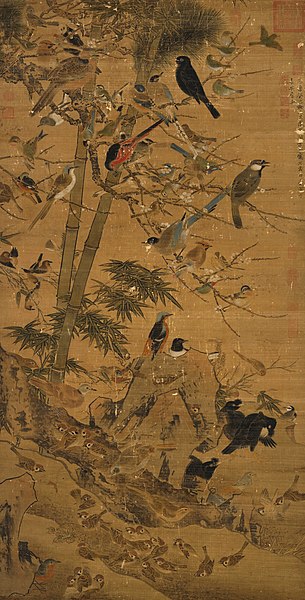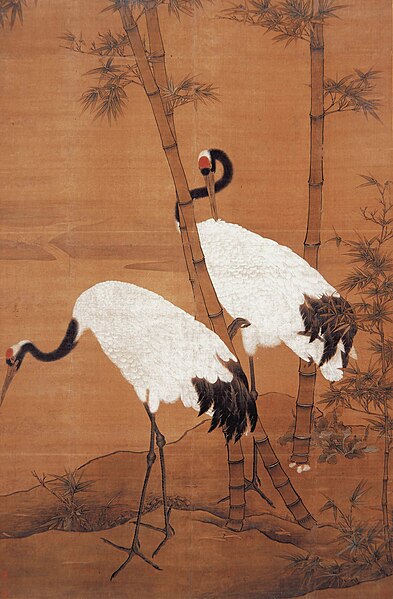 1
1title: Die drei Freunde und hundert Vögel
artist: <bdi><a href="https://en.wikipedia.org/wiki/en:Bian_Jingzhao" class="extiw" title="w:en:Bian Jingzhao">Bian Jingzhao</a> </bdi>
date: 1413<div style="display: none;">date QS:P571,+1413-00-00T00:00:00Z/9</div>
medium: de 1=Tusche und Farben auf Seide
current location: Institution:National Palace Museum de|1=Formosa
source: Yorck
credit: <cite class="book" style="font-style:normal">The Yorck Project (<span style="white-space:nowrap"><time class="dtstart" datetime="2002">2002</time></span>) <i> 10.000 Meisterwerke der Malerei</i> (DVD-ROM), distributed by <a href="//commons.wikimedia.org/wiki/Commons:10,000_paintings_from_Directmedia" title="Commons:10,000 paintings from Directmedia">DIRECTMEDIA</a> Publishing GmbH. <small><a href="https://en.wikipedia.org/wiki/International_Standard_Book_Number" class="extiw" title="en:International Standard Book Number">ISBN</a>: <a href="//commons.wikimedia.org/wiki/Special:BookSources/3936122202" title="Special:BookSources/3936122202">3936122202</a>. </small></cite>
license:Public domain
 2
2title: <div class="fn"> Three Friends and a Hundred Birds 三友百禽</div>
artist: <bdi><a href="https://en.wikipedia.org/wiki/en:Bian_Jingzhao" class="extiw" title="w:en:Bian Jingzhao">Bian Jingzhao</a> </bdi>
date: 1413<div style="display: none;">date QS:P571,+1413-00-00T00:00:00Z/9</div>
dimensions: 151.3 x 78.1 cm
current location: Institution:National Palace Museum
source: For the 13 February 2008 upload, the source is [http://www.nigensha.co.jp/kokyu/en/p34.html Pien Wen-chin: Three Friends and a Hundred Birds]. Nigensha.<br/> For the 1 April 2010 upload, no source was provided by the uploader.
credit: For the 13 February 2008 upload, the source is <a rel="nofollow" class="external text" href="https://www.nigensha.co.jp/kokyu/en/p34.html">Pien Wen-chin: Three Friends and a Hundred Birds</a>. Nigensha.<br> For the 1 April 2010 upload, no source was provided by the uploader.
license:Public domain
 3
3title: <i>Bamboo and Cranes - Twin Clarity</i>
artist: <bdi><a href="https://en.wikipedia.org/wiki/en:Bian_Jingzhao" class="extiw" title="w:en:Bian Jingzhao">Bian Jingzhao</a> </bdi>
date: Early Ming Dynasty (1368–1644)
medium: technique hanging scroll ; technique Color paper
dimensions: size cm 109 44.6
current location: Palace Museum, Beijing
source: Zhongguo gu dai shu hua jian ding zu (中国古代书画鑑定组). 2000. Zhongguo hui hua quan ji (中国绘画全集). Zhongguo mei shu fen lei quan ji. Beijing: Wen wu chu ban she. Volume 10.
credit: Zhongguo gu dai shu hua jian ding zu (中国古代书画鑑定组). 2000. Zhongguo hui hua quan ji (中国绘画全集). Zhongguo mei shu fen lei quan ji. Beijing: Wen wu chu ban she. Volume 10.
license:Public domain
 4
4title: <i>Four Magpies</i>
artist: <bdi><a href="https://en.wikipedia.org/wiki/en:Bian_Jingzhao" class="extiw" title="w:en:Bian Jingzhao">Bian Jingzhao</a> </bdi>
date: Early Ming Dynasty (1368–1644)
medium: technique hanging scroll ; technique color silk
dimensions: size cm 122.8 60.4
current location: :museum:NPM
source: http://tech2.npm.gov.tw/cheschool/zh-tw/index.aspx?content=c_2_27
credit: <a rel="nofollow" class="external free" href="http://tech2.npm.gov.tw/cheschool/zh-tw/index.aspx?content=c_2_27">http://tech2.npm.gov.tw/cheschool/zh-tw/index.aspx?content=c_2_27</a>
license:Public domain
 5
5title: Bian Jingzhao. Bamboo and Cranes. Palace Museum, Beijing
artist: <bdi><a href="https://en.wikipedia.org/wiki/en:Bian_Jingzhao" class="extiw" title="w:en:Bian Jingzhao">Bian Jingzhao</a> </bdi>
date: Early Ming Dynasty 1426-1435
medium: Hanging scroll, ink and color on silk
source: self-scanned
credit: Self-scanned
description: <u style="background-color:yellow;" class="">bian</u> <u style="background-color:yellow;" class="">jingzhao</u>. <i>Bamboo and Cranes</i>. Palace Museum, Beijing, 180x118cm.
license:Public domain
 6
6title: <div class="fn"> <span ><span dir="ltr" lang="en"><i>Wild geese in the waters of San Xiang.</i></span></span><div style="display: none;">label QS:Len,"Wild geese in the waters of San Xiang."</div> <div style="display: none;">label QS:Lpl,"Dzikie gęsi na wodach San Xiang."</div> </div>
artist: <bdi><a href="https://en.wikipedia.org/wiki/en:Bian_Jingzhao" class="extiw" title="w:en:Bian Jingzhao">Bian Jingzhao</a> </bdi>
date: turn of the 14/15<sup>th</sup> century
medium: Technique ink and=watercolor silk
dimensions: size cm 83.5 41
current location: Institution:National Museum, Warsaw
source: Dorota Folga-Januszewska (2005). ''Muzeum Narodowe w Warszawie : arcydzieła malarstwa''. Arkady. ISBN|83-21343-31-7
credit: Dorota Folga-Januszewska (2005). <i>Muzeum Narodowe w Warszawie : arcydzieła malarstwa</i>. Arkady. <a href="//commons.wikimedia.org/wiki/Special:BookSources/83-21343-31-7" title="Special:BookSources/83-21343-31-7">ISBN 83-21343-31-7</a>
license:Public domain
 7
7title: <div class="fn"> Chinese woodcut, Famous medical figures: Sun Simiao</div>
artist: <div class="fn value"> Gan Bozong (Tang period, 618-907)</div>
source: https://wellcomeimages.org/indexplus/obf_images/f7/9e/94a41d43ae53679850a89cc8e340.jpg (hi-res image) * Gallery: https://wellcomeimages.org/indexplus/image/L0039324.html * Wellcome Collection gallery (2018-03-28): https://wellcomecollection.org/works/v4exceyg [https://creativecommons.org/licenses/by/4.0/ CC-BY-4.0]
credit: <p><a rel="nofollow" class="external free" href="https://wellcomeimages.org/indexplus/obf_images/f7/9e/94a41d43ae53679850a89cc8e340.jpg">https://wellcomeimages.org/indexplus/obf_images/f7/9e/94a41d43ae53679850a89cc8e340.jpg</a> (hi-res image) </p> <ul> <li>Gallery: <a rel="nofollow" class="external free" href="https://wellcomeimages.org/indexplus/image/L0039324.html">https://wellcomeimages.org/indexplus/image/L0039324.html</a> </li> <li>Wellcome Collection gallery (2018-03-28): <a rel="nofollow" class="external free" href="https://wellcomecollection.org/works/v4exceyg">https://wellcomecollection.org/works/v4exceyg</a> <a rel="nofollow" class="external text" href="https://creativecommons.org/licenses/by/4.0/">CC-BY-4.0</a> </li> </ul>
description: <div class="description"> <p>One of a series of woodcuts of illustrious physicians and legendary founders of Chinese medicine from an edition of Bencao mengquan (Introduction to the Pharmacopoeia), engraved in the Wanli reign period of the Ming dynasty (1573-1620) -- Volume preface, 'Lidai mingyi hua xingshi' (Portraits and names of famous doctors through history). The images are attributed to a Tang (618-907) creator, Gan Bozong. The account in 'Portraits and Names of Famous Doctors through History' states: Sun Simiao was a native of Huayuan, <u style="background-color:yellow;" class="">jingzhao</u>. He was a gifted child, with a retentive memory, and as an adult he was able to discourse on the various schools of philosophy derived from Laozi and Zhuangzi. At the end of the Northern and Southern Dynasties period (420-589), he retreated to Taibai Mountain, to study Daoism and practice breathing exercises and self-cultivation. Though Emperor Wen of the Sui (581-618) offered him the position of Guozi boshi (Erudite of the National University), and Emperor Gaozong subsequently invited him to the Tang court, he steadfastedly refused public office. He was skilled in astronomical divination and had made a profound study of medicine and drugs. His character was philanthropic and charitable, and he cared for all living things. So the story goes, he once witnessed a man in the act of killing a grass snake. He took off his outer garment, which he offered in exchange for the snake's life, then he dressed the creature's wounds and set it free.<br>Woodcut </p> <br>By: Gan Bozong (Tang period, 618-907)</div>
license:CC BY 4.0
 8
8title: <div class="fn"> <span ><span dir="ltr" lang="en"><i>Sleeping Bird on a Prunus Branch <a href="https://www.wikidata.org/wiki/Q60469873#P1476" title="Edit this at Wikidata"><img alt="Edit this at Wikidata" src="https://upload.wikimedia.org/wikipedia/commons/thumb/8/8a/OOjs_UI_icon_edit-ltr-progressive.svg/10px-OOjs_UI_icon_edit-ltr-progressive.svg.png" decoding="async" width="10" height="10" style="vertical-align: text-top" srcset="https://upload.wikimedia.org/wikipedia/commons/thumb/8/8a/OOjs_UI_icon_edit-ltr-progressive.svg/15px-OOjs_UI_icon_edit-ltr-progressive.svg.png 1.5x, https://upload.wikimedia.org/wikipedia/commons/thumb/8/8a/OOjs_UI_icon_edit-ltr-progressive.svg/20px-OOjs_UI_icon_edit-ltr-progressive.svg.png 2x" data-file-width="20" data-file-height="20"></a></i></span></span><div style="display: none;">title QS:P1476,en:"Sleeping Bird on a Prunus Branch <a href="https://www.wikidata.org/wiki/Q60469873#P1476" title="Edit this at Wikidata"><img alt="Edit this at Wikidata" src="https://upload.wikimedia.org/wikipedia/commons/thumb/8/8a/OOjs_UI_icon_edit-ltr-progressive.svg/10px-OOjs_UI_icon_edit-ltr-progressive.svg.png" decoding="async" width="10" height="10" style="vertical-align: text-top" srcset="https://upload.wikimedia.org/wikipedia/commons/thumb/8/8a/OOjs_UI_icon_edit-ltr-progressive.svg/15px-OOjs_UI_icon_edit-ltr-progressive.svg.png 1.5x, https://upload.wikimedia.org/wikipedia/commons/thumb/8/8a/OOjs_UI_icon_edit-ltr-progressive.svg/20px-OOjs_UI_icon_edit-ltr-progressive.svg.png 2x" data-file-width="20" data-file-height="20"></a>"</div> <div style="display: none;">label QS:Len,"Sleeping Bird on a Prunus Branch <a href="https://www.wikidata.org/wiki/Q60469873#P1476" title="Edit this at Wikidata"><img alt="Edit this at Wikidata" src="https://upload.wikimedia.org/wikipedia/commons/thumb/8/8a/OOjs_UI_icon_edit-ltr-progressive.svg/10px-OOjs_UI_icon_edit-ltr-progressive.svg.png" decoding="async" width="10" height="10" style="vertical-align: text-top" srcset="https://upload.wikimedia.org/wikipedia/commons/thumb/8/8a/OOjs_UI_icon_edit-ltr-progressive.svg/15px-OOjs_UI_icon_edit-ltr-progressive.svg.png 1.5x, https://upload.wikimedia.org/wikipedia/commons/thumb/8/8a/OOjs_UI_icon_edit-ltr-progressive.svg/20px-OOjs_UI_icon_edit-ltr-progressive.svg.png 2x" data-file-width="20" data-file-height="20"></a>"</div> </div>
artist: <bdi><a href="https://en.wikipedia.org/wiki/en:Bian_Jingzhao" class="extiw" title="w:en:Bian Jingzhao">Bian Jingzhao</a> </bdi>
date: between 1426 and 1435 <div style="display: none;">date QS:P,+1450-00-00T00:00:00Z/7,P1319,+1426-00-00T00:00:00Z/9,P1326,+1435-00-00T00:00:00Z/9</div> <a href="https://www.wikidata.org/wiki/Q60469873#P571" title="Edit this at Wikidata"><img alt="Edit this at Wikidata" src="https://upload.wikimedia.org/wikipedia/commons/thumb/8/8a/OOjs_UI_icon_edit-ltr-progressive.svg/10px-OOjs_UI_icon_edit-ltr-progressive.svg.png" decoding="async" width="10" height="10" style="vertical-align: text-top" srcset="https://upload.wikimedia.org/wikipedia/commons/thumb/8/8a/OOjs_UI_icon_edit-ltr-progressive.svg/15px-OOjs_UI_icon_edit-ltr-progressive.svg.png 1.5x, https://upload.wikimedia.org/wikipedia/commons/thumb/8/8a/OOjs_UI_icon_edit-ltr-progressive.svg/20px-OOjs_UI_icon_edit-ltr-progressive.svg.png 2x" data-file-width="20" data-file-height="20"></a>
source: https://clevelandart.org/art/1967.249
credit: <a rel="nofollow" class="external free" href="https://clevelandart.org/art/1967.249">https://clevelandart.org/art/1967.249</a>
license:Public domain
 9
9title: <div class="fn"> Hundred Birds and the Three Friends</div>
artist: <div class="fn value"> Bian Wenjin</div>
date: 1400<div style="display: none;">date QS:P571,+1400-00-00T00:00:00Z/9</div>
medium: Hanging scroll, ink and color on silk
dimensions: Overall: 152.1 x 95.3 cm (59 7/8 x 37 1/2 in.)
current location: institution:Cleveland Museum of Art
source: https://clevelandart.org/art/1980.12
credit: <a rel="nofollow" class="external free" href="https://clevelandart.org/art/1980.12">https://clevelandart.org/art/1980.12</a>
description: <div class="description"> Among the most talented court painters of the Ming dynasty (1368–1644), <u style="background-color:yellow;" class="">bian</u> Wenjin was known for harmoniously combining elegant calligraphic brushwork with meticulous realism. From his close observations of nature, he carefully depicted four large magpies, medium-sized songbirds (bulbuls) with white necks and black heads, and numerous small sparrows in this painting. Ming period bird-and-flower paintings, as exemplified in this work, became much more ostentatious in size and color scheme than those in earlier periods. Like many imperially commissioned works of art, <u style="background-color:yellow;" class="">bian</u>’s bird-and-flower works served as a vehicle to convey auspicious meanings or positive political messages for his imperial patrons. The “hundred bird” theme symbolizes the prosperity of a state under the rule of a sophisticated emperor. The “three friends of winter”—pine, bamboo, and plum blossoms—represent one’s enduring perseverance in a harsh environment.</div>
license:CC0




